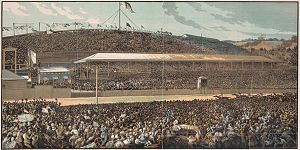The Melbourne Cup
| Group I race | |

Engraving of the finish line at the 1881 Melbourne Cup
|
|
| Location |
Flemington Racecourse Melbourne, Victoria, Australia |
|---|---|
| Inaugurated | 1861 (List of Melbourne Cup winners) |
| Race type | Thoroughbred – Flat racing |
| Sponsor | Emirates Airline |
| Website | Flemington Racecourse |
| Race information | |
| Distance | 3,200 metres (2.0 miles) |
| Surface | Turf |
| Track | Left-handed |
| Qualification | Three-year-olds and up |
| Weight | Handicap |
| Purse | A$6,200,000 (2014) |
The Melbourne Cup is Australia's most prestigious annual Thoroughbred horse race. It is a 3,200 metre race for three-year-olds and over, conducted by the Victoria Racing Club on the Flemington Racecourse in Melbourne, Victoria as part of the Melbourne Spring Racing Carnival. It is the richest "two-mile" handicap in the world, and one of the richest turf races. The event starts at 3pm on the first Tuesday in November and is known locally as "the race that stops a nation".
The Melbourne Cup has a long tradition with the first race held in 1861 over two miles (3.219 km) but was shortened to 3,200 metres (1.988 mi) in 1972 when Australia adopted the metric system. This reduced the distance by 18.688 metres (61.312 ft), and Rain Lover's 1968 race record of 3:19.1 was accordingly adjusted to 3:17.9. The present record holder is the 1990 winner Kingston Rule with a time of 3:16.3.
The race is a quality handicap for horses 3 years old and over, run over a distance of 3,200 metres, on the first Tuesday in November at Flemington Racecourse. The minimum handicap weight is 50 kg. There is no maximum weight, but the top allocated weight must not be less than 57 kg. The weight allocated to each horse is declared by the VRC Handicapper in early September.
The Melbourne Cup race is a handicap contest in which the weight of the jockey and riding gear is adjusted with ballast to a nominated figure. Older horses carry more weight than younger ones, and weights are adjusted further according to the horse's previous results.
Weights were theoretically calculated to give each horse an equal winning chance in the past, but in recent years the rules were adjusted to a "quality handicap" formula where superior horses are given less severe weight penalties than under pure handicap rules.
After the declaration of weights for the Melbourne Cup, the winner of any handicap flat race of the advertised value of A$55,000 or over to the winner, or an internationally recognised Listed, Group, or Graded handicap flat race, shall carry such additional weight (if any), for each win, as the VRC Handicapper shall determine.
...
Wikipedia
